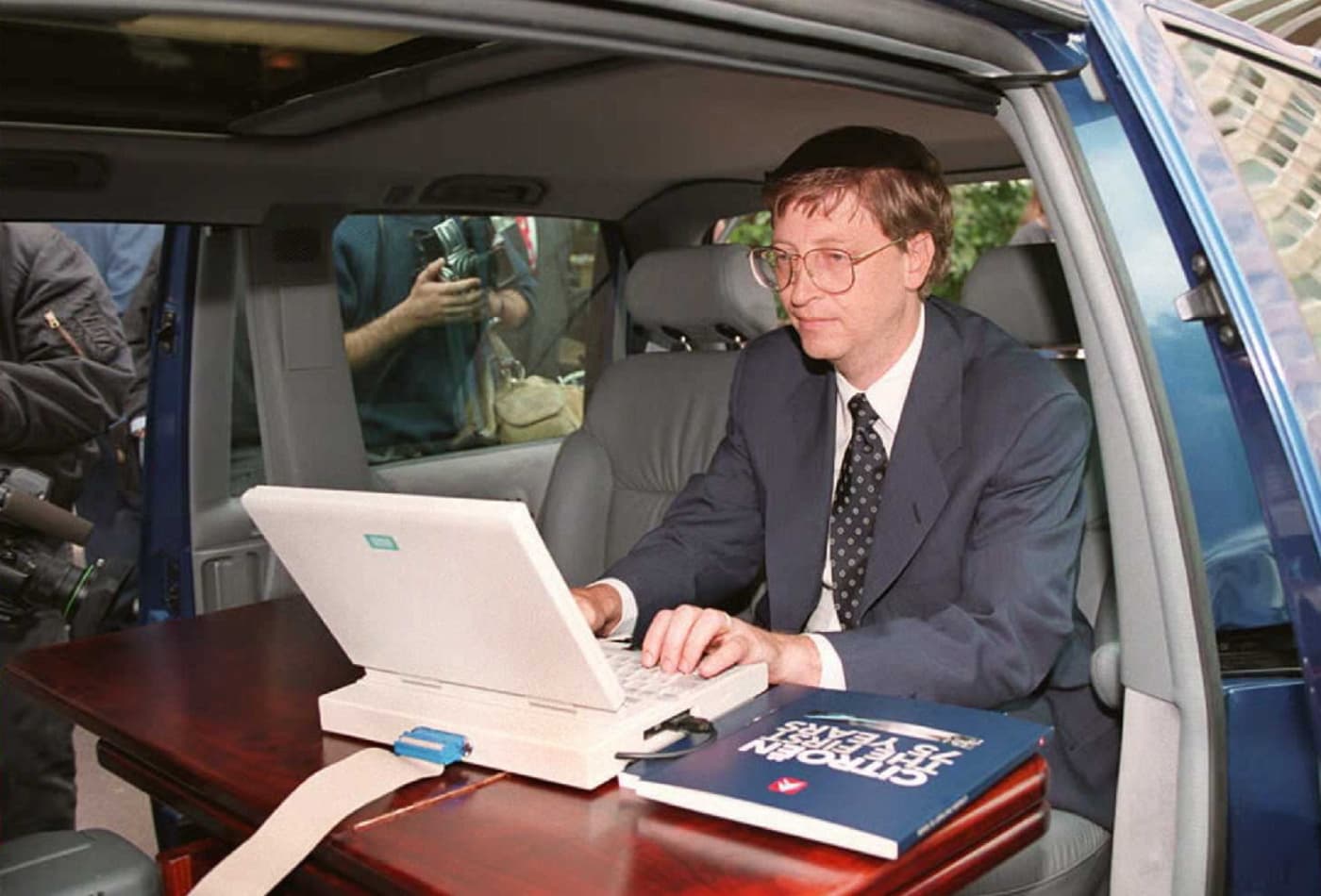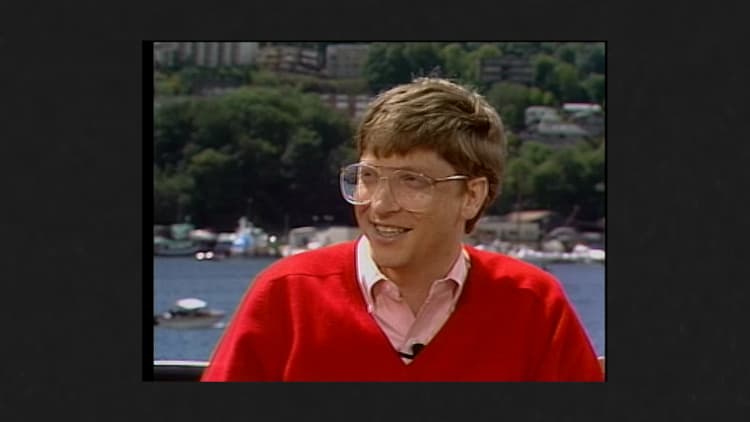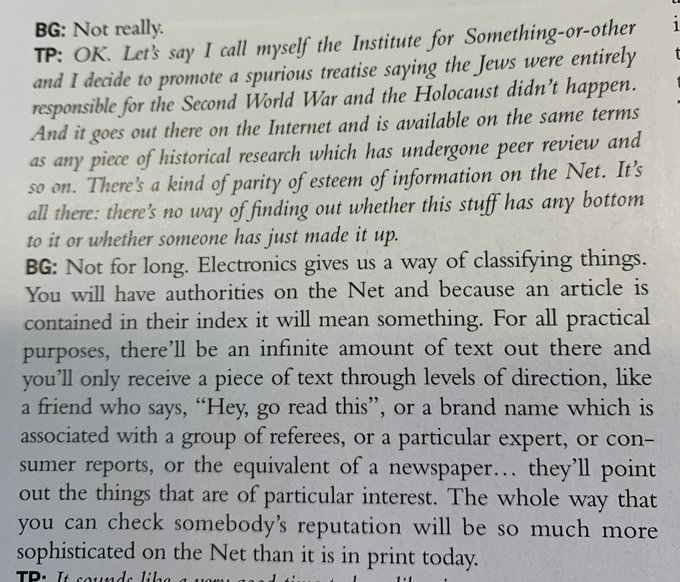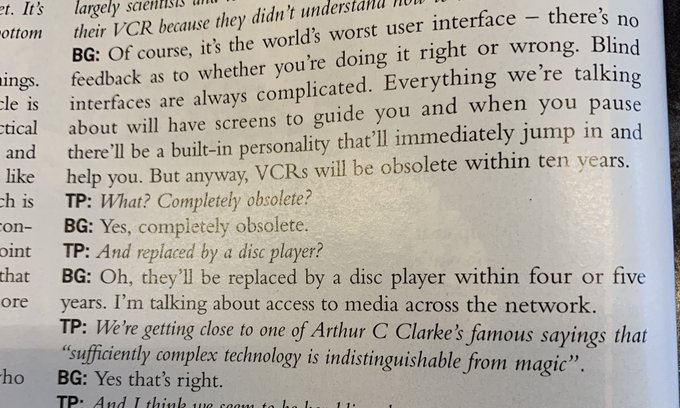
Today, pretty much everyone regularly uses the internet to read breaking news and stream the latest blockbuster films. But in 1995, the internet was still in its infancy, and many Americans weren’t even online yet.
Bill Gates — as the co-founder of Microsoft (which made Internet Explorer, one of the first web browsers) — likely knew as much about the potential of internet technology as anyone in the mid-90s, however. So it’s not shocking that in 1995 Gates would be asked for his predictions on what the internet might look like a couple of decades into the future.
That’s exactly what happened when Gates sat down with author and journalist Terry Pratchett for an interview that appeared in the July 1995 edition of GQ magazine’s UK version. At the time, Gates was 39 and the world’s richest person with a net worth of $12.9 billion (he’s now second to Jeff Bezo with a $99.6 billion net worth, according to Forbes).
Gates’ conversation with Pratchett recently resurfaced online when writer Marc Burrows, who is working on a biography of Pratchett, tweeted two screenshots of the magazine interview (Gates is identified in the interview screenshots as “BG” and Pratchett is “TP”).
Not surprisingly, Gates had a couple of predictions for the future of the internet — one of which would turn out to be eerily prescient, while the other one seems to have come up short.
One prediction that Gates nailed was that the internet would forever change the way we consume entertainment, like movies and television shows. At the time, most people’s idea of a home entertainment system was a television hooked up to a VCR (electronic devices that played VHS tapes for anyone too young to remember), though video discs like DVDs were beginning to be introduced by the mid-90s.
In the interview, Pratchett is astounded when Gates tells him that “VCRs will be obsolete within ten years.”
“What? Completely obsolete?” asks Pratchett, who then asks if discs will be the primary home video format.
“Oh, they’ll be replaced by a disc player within four or five years,” Gates says. “I’m talking about access to media across the network.”
In other words, Gates is describing our ability to watch movies, TV shows and other streaming videos online. Gates, who complained that VCRs had “the world’s worst user interface,” went on to explain: “Everything we’re talking about will have screens to guide you and when you pause there’ll be a built-in personality that’ll immediately jump in and help you.”
Gates’ prediction ended up being pretty much on the money, as online video technology continued to improve over the next decade to the point where the now-ubiquitous video streaming platform YouTube was founded in 2005, 10 years after this interview took place. In 2007, Netflix announced plans to start streaming full movies and shows online. Today, Netflix has nearly 150 million streaming subscribers around the world, while more than two billion people watch videos on YouTube every month.

Pratchett also wanted to know if Gates thought that the internet would eventually make it easier to spread misinformation to large groups of people.
“There’s a kind of parity of esteem of information on the Net,” Pratchett remarked to Gates in the interview. “It’s all there: there’s no way of finding out whether this stuff has any bottom to it or whether someone just made it up.”
As an example, Pratchett proposed a hypothetical situation where someone purporting to be an expert promoted a theory online claiming that the Holocaust never happened. That theory, Pratchett argued, could be propped up on the internet and “available on the same terms as any piece of historical research which has undergone peer review and so on.”
While Pratchett’s biographer, Burrows, argued on Twitter this week that Pratchett had “accurately predicted how the internet would propagate and legitimise fake news,” Gates’ response is worth noting for the fact that the Microsoft co-founder failed to foresee the same negative effects of online misinformation.
Gates agreed with Pratchett that misinformation could be spread online, but “not for long,” the billionaire reasoned. For instance, Gates argued, the internet could contain fake news, but it would also create more opportunities for information to be verified and supported by appropriate authorities, from actual experts to journalists and consumer reports.
“The whole way that you can check somebody’s reputation will be so much more sophisticated on the Net than it is in print today,” Gates tells Pratchett.
Of course, we know now that many online platforms — from social media sites like Facebook to online video sites like YouTube — have struggled to squash the spread of misinformation and fake news on the internet. Even Gates himself says today that he’s concerned about the spread of misinformation online, admitting that “it’s turned out to be more of a problem than I, or many others, would have expected.”
But Gates also said, in a 2018 interview with Quartz, that he remains optimistic that the internet will continue to become more sophisticated as an information source over time, and that the benefits of having access to such a wealth of information on the internet will eventually outweigh the “challenges” of separating fact from fiction online.
[“source=cnbc”]


